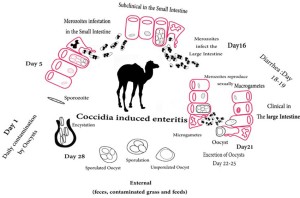
Eimeria Parasite Infection in Camels
Eimeria is a genus of protozoan parasites belonging to the family Eimeriidae, known for infecting the intestinal tracts of various animals. Among these hosts, camels (Camelus dromedarius and Camelus bactrianus) are particularly susceptible to Eimeria infections, which can lead to significant health issues and economic losses in camel husbandry.The life cycle of Eimeria is complex, involving both sexual and asexual reproduction stages. The transmission occurs primarily through the fecal-oral route, where camels ingest oocysts— the infective form of the parasite— from contaminated feed, water, or surfaces. Once ingested, the oocysts hatch in the intestine, releasing sporozoites that invade intestinal epithelial cells, where they multiply and eventually cause cell damage.Clinical symptoms of Eimeria infections in camels include diarrhea, weight loss, dehydration, and lethargy, with young or stressed animals being more vulnerable to severe illness. Diagnosing the infection involves examining fecal samples under a microscope to detect oocysts. Treatment often includes anticoccidial medications like sulfadimethoxine or monensin, alongside supportive care such as rehydration and proper nutrition. Preventing infections relies heavily on hygiene, balanced diets to strengthen immunity, and stress management to reduce vulnerability. By following these prevention and treatment strategies, camel farmers can safeguard animal health and productivity, ensuring sustainable camel husbandry practices.
